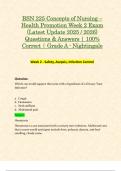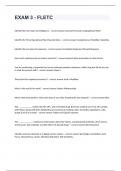BSN 225 Concepts of Nursing –
Health Promotion Week 2 Exam
(Latest Update )
Questions & Answers | 100%
Correct | Grade A - Nightingale
Week 2 - Safety, Asepsis, Infection Control
Question:
Which cue would support the nurse with a hypothesis of a Urinary Tract
Infection?
a. Cough
b. Hematuria
c. Neck stiffness
d. Abdominal pain
Answer:
Hematuria
Hematuria is a cue associated with a urinary tract infection. Additional cues
that a nurse would anticipate include fever, polyuria, dysuria, and foul-
smelling, cloudy urine.
,Question:
Which patient behavior supports the nurse's hypothesis of a knowledge
deficit?
a. Refusal to eat yogurt served on lunch tray
b. Inability to perform incisional care
c. Explanation from patient about correct diet
d. Untouched informational booklets at bedside
Answer:
Inability to perform incisional care
This behavior supports the nurse's hypothesis of a knowledge deficit. The
patient either lacks the knowledge about how to perform the procedure or
needs instruction and practice performing the procedure.
Question:
Which nursing hypothesis would the nurse add to the care plan after noting
an open pressure injury on the patient's coccyx during assessment?
a. Lack of Knowledge
b. Impaired Skin Integrity
c. Impaired Nutritional Status
d. Acute Pain
Answer:
Impaired Skin Integrity
Impaired Skin Integrity is the nursing hypothesis the nurse should place on
the patient's care plan. It addresses the patient's open pressure injury.
,Question:
Which factors would cause a nurse to increase the priority of a patient with an
infection?
Select all that apply.
a. Sepsis
b. Diabetes
c. High fever
d. Hearing deficit
e. Altered mental status
f. Multidrug resistant organisms
Answer:
Sepsis
Systemic inflammatory response syndrome (SIRS), sepsis, diabetes, high
fever, altered mental status, and multidrug resistant organisms are factors
that indicate an increased severity of infection and require prioritization by
the nurse.
Diabetes
Systemic inflammatory response syndrome (SIRS), sepsis, diabetes, high
fever, altered mental status, and multidrug resistant organisms are factors
that indicate an increased severity of infection and require prioritization by
the nurse.
High fever
Systemic inflammatory response syndrome (SIRS), sepsis, diabetes, high
fever, altered mental status, and multidrug resistant organisms are factors
that indicate an increased severity of infection and require prioritization by
the nurse.
, Altered mental status
Systemic inflammatory response syndrome (SIRS), sepsis, diabetes, high
fever, altered mental status, and multidrug resistant organisms are factors
that indicate an increased severity of infection and require prioritization by
the nurse.
Multidrug resistant organisms
Systemic inflammatory response syndrome (SIRS), sepsis, diabetes, high
fever, altered mental status, and multidrug resistant organisms are factors
that indicate an increased severity of infection and require prioritization by
the nurse.
Question:
Which findings are measurable data that can be used to determine whether a
patient is meeting infection-related goals?
Select all that apply.
a. Handwashing
b. Diaphoresis
c. Pain
d. Nausea
e. Fatigue
f. Fever
Answer:
Handwashing





